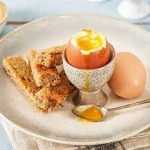Can’t Cook? Can’t Even Boil An Egg
 Can't even boil an egg. The ultimate culinary put down. But why, one wonders? Can't even make toast, or can't even open a tin might surely be more damning. The topic came up the other day in The Knowledge, a daily newsletter which has interesting features on politics, society, arts and miscellaneous trivia.
Can't even boil an egg. The ultimate culinary put down. But why, one wonders? Can't even make toast, or can't even open a tin might surely be more damning. The topic came up the other day in The Knowledge, a daily newsletter which has interesting features on politics, society, arts and miscellaneous trivia.
Twenty years ago, I might have been among the number of the put down merchants, until I changed my cooker. But we'll come to that. Seeking proof of the assertion that egg boiling is the simplest culinary task known to mankind, I turned to the Bible, Larousse Gastronomique. There are, it tells us, three ways for soft boiled eggs.
1 - Plunge the egg into boiling water and cook; 2 - put into boiling water, a short cook, then leave to stand, and 3 - put into cold water, heat and remove as soon as the water boils! Yes, really. I'm still gobsmacked. But for method 1, you cook for 3 minutes: for method 2, they say, boil for 1 minute and leave for 3. No thanks, guys.
In fairness, they do say that these timings give whites that are softly set and runny yolks and that you should adjust the timings to your taste. Let's turn to another authority, The British Egg Industry Council (not to be confused with the British Egg Association, the British Egg Products Association, the British Free Range Egg Producers' Association or the National Egg Marketing Association - I'm not making these up). They tell us to go down the cold water route. Bring the water to the boil, three minutes for a really soft boiled yolk, four for a slightly set yolk and five for a firmer yolk.
I used to be in that camp, allowing three and a half minutes after the water came to the boil, But if we are teaching our novice, that's a really unreliable method. Let's assume you are using large eggs. At least that's one variable removed. But how big a pan are you using, how much water do you put in and what is your heat source? I used the same pan filled to the same level, so in my case they were constants - until I changed from a gas to an induction hob. Suddenly my once perfect boiled egg was coming out with the white still runny. Bleugh! The reason for that is that an induction hob will boil the water so much faster, thus reducing the actual cooking time.
Reading the article quoted in The Knowledge, I'm pleased to see that I've joined the professionals. In my case, into boiling water for five and a half minutes. That's exactly as Jamie Oliver does his, as per a useful YouTube video which I've discovered. He also has a few more tips. I get more than my fair share of cracked eggs (and no, I don't keep mine in the fridge - as if). Jamie suggests a tiny drop of salt in the water, something to do with equalising the tiny amount of salt in the egg itself. Nigella (who is a version 2 lady) apparently puts a matchstick in the pan. This, she claims, stops any white escaping a cracked shell. Apparently it has something to do with the phosphorus in the match head. Not getting my vote.
That just leaves the question of what you do when you remove it. Yes, eat it, but how? If you know your Jonathan Swift, you will recall that in Gulliver's Travels this was the cause of a war between Blefuscu and Lilliput. The latter cut their eggs at the small end. Jamie and the Blefuscuns start at the other end. I can't get too uptight about this, but I'm with the Lilliputians on this one. What I don't get is the habit south of the border of tapping the top of the egg with a spoon. A sure way of getting a morsel of shell with every bite. A good whack with a knife, in best executioner style, cuts it here in Johnston Towers.

Michel Roux
The last word to the late, great Michel Roux. a proponent of method 1. He says he was taught 3:6:9, where 3 minutes is for ultra soft, probably where you would be going to do something more with the egg, 6 is for a soft boiled breakfast egg, and 9 is for hard boiled. See that Michel Roux - he could boil an egg.
Tom, I am sure that your advice is helpful.
I was surprised that you did not mention the choice of egg. Like Rick Stein we always use Burford Browns which are always the most expensive eggs in the shop. These eggs have a deep golden yolk and rich flavour. Well worth the extra cost.